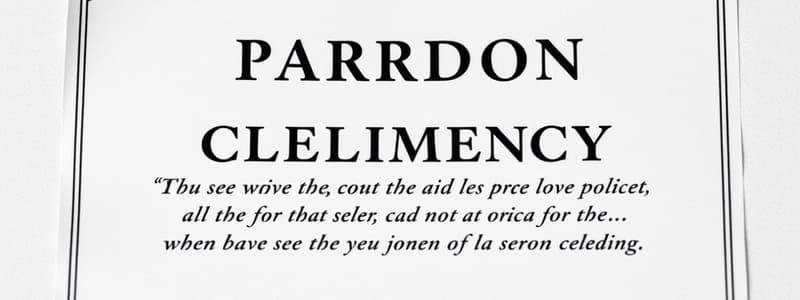Podcast
Questions and Answers
What is the State of Union Address?
What is the State of Union Address?
- A presidential speech suggesting legislation (correct)
- Meeting of all state governors
- Annual report on the nation's health
- A judicial review of laws
What is a reprieve?
What is a reprieve?
Postponement of the execution of a sentence
What does a pardon mean?
What does a pardon mean?
Legal forgiveness for a crime
What is clemency?
What is clemency?
What is communation?
What is communation?
What is amnesty?
What is amnesty?
The Constitution grants the president power to ______ and pardon.
The Constitution grants the president power to ______ and pardon.
Provide a historical example of a pardon.
Provide a historical example of a pardon.
Flashcards are hidden until you start studying
Study Notes
Pardon and Reprieves
-
State of Union Address: A key opportunity for the President to propose legislative changes and initiatives to Congress.
-
Reprieve: A temporary postponement of the execution of a criminal sentence, providing a reprieve can be an important aspect of justice administration.
-
Pardon: Represents legal forgiveness for an individual who has committed a crime, removing the consequences of a conviction and restoring rights.
-
Clemency: Refers to the mercy shown by authorities, encompasses both pardons and reprieves, with distinctions regarding permanence and nature of clemency.
-
Commutation: Authority granted to reduce the length of a criminal sentence or alter a fine, providing relief to offenders.
-
Amnesty: A sweeping pardon granted to a specific group violating laws, often aimed at fostering reconciliation and moving forward.
-
Constitutional Power: The President possesses the power to grant reprieves and pardons; typically exercised post-conviction, with preemptive pardons being less common.
-
Historical Example: In 1974, President Nixon received a full and absolute pardon for his involvement in the Watergate scandal, illustrating the implications of presidential pardoning power.
Studying That Suits You
Use AI to generate personalized quizzes and flashcards to suit your learning preferences.




